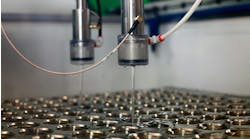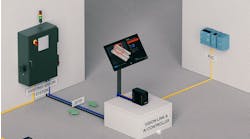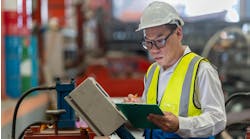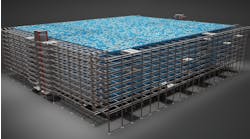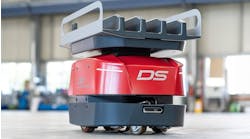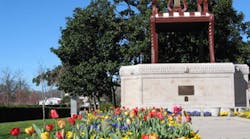Restoring the 'Maker Spirit' to Thomasville that Lost an Industry and Jobs to China
After my article that featured The Forge in Greensboro was published, I was contacted by Joel Leonard, who informed me that he worked with the original founders of The Forge as the community developer to help uncover equipment and talent and set up initial programs “to convert Greensboring to Greensciting.”
He said, “We hosted numerous large events to get the community aware of our efforts, such as a Silo Busting Roundtable to connect various groups in our society together to have meaningful conversation together about manufacturing challenges. Then, some of the area employers shipped numerous tractor trailer loads of equipment, and we were able to sell what we couldn’t use and generate capital to pay for our lease, insurance, and other operational costs. In the first year of The Forge, we launched 16 new companies, had 9 patents filed, and helped over 50 get connected to new jobs.”
I asked how he became involved with the makerspace movement, and he responded, "Fifteen years ago, I decided to make it my life’s mission to build the next generation of skilled technicians (i.e. makers). I realized to reach the masses, a book or magazine may not make the cut, but more may listen to a song.
“I wrote the lyrics to the ‘Maintenance Crisis Song,’ which has been played at dozens of engineering conferences all over the globe, on NPR and CNBC, at the Rock and Roll Hall of Fame, and during the U.S. Congressional Forum on how to revitalize the U.S. economy. To reach a larger audience, it has been recorded in 15 different genres, that include rock, opera, hip hop, bluegrass, reggae, blues, funk, gospel, pop rock, and two Greek versions."
He added, “Once I learned about the maker movement, and how it connects directly to all that I had already been doing, I quickly joined in and have been helping connect manufacturing leaders to makerspaces. Organizations around the world come to me to tell them what to do to advance their workforce development strategies, and, even better, sometimes I get paid for it.”
After leaving The Forge in the good hands of Joe Rotondi, he was freed up to consult and support makerspaces around the country like Newton Conover Middle School, Makerspace CT, Make Nashville, NASA Langley, St. Louis, and numerous others. He is currently involved with developing a makerspace in Thomasville, N.C.
When I asked how he became involved with Thomasville, he said, “Last June, Thomasville City Councilwoman Wendy Sellars of Thomasville, N.C., asked me to build a makerspace in her community that had been devastated by Thomasville Furniture’s departure to China. I realized that I could not say no to helping revitalize Thomasville’s manufacturing economy because I worked at Thomasville Furniture to pay for college during the third shift starting in June of 1986. It was a great summer job because I was paid $8 per hour, which was much better than other jobs at that time.”
He commented, “If you have any pieces of Thomasville furniture made during the late 1980s, chances are the veneer on the furniture was put there by me and my team. I worked behind a veneer press. The veneer press was an old furnace that was acquired via a WWII military auction from Germany, and it heated the thinly sliced sections of wood veneer to particle board that had been slathered with glue for 10 minutes at close to 1,000 degrees. I worked on the crew that took the 4-feet by 8-feet aluminum sheets out of the oven. The veneers were used for tables, chair seats, armoires, and entertainment centers for televisions.
There was no air conditioning, and the fans didn’t help much, so I had to drink gallons each shift to keep hydrated. But, I had to keep my wits about me and keep up with my assigned partner to synchronize our movements, or one of us would get 2nd degree burns on our wrists. Although it was hard work, it was great pay for the time and gave me a sense of accomplishment seeing the stacks of veneer we made each shift and then later see the finished goods on display in galleries and sent to the High Point Furniture Market to be sold in retail outlets all over the world.”
Leonard explained, “At that time, Thomasville Furniture offered those with just a little education the opportunity to earn a steady income. Skilled labor was getting paid $15/hour, which would be around $30/hour at today’s rates. Now, Thomasville is without a middle-class because of loss of job opportunities and is struggling to keep crime under control. The whole community of 27,000 is at risk of living in poverty.”
Continuing, he said, “I was hesitant to agree to commit to building a makerspace immediately because I know that just building a makerspace isn’t always the solution. I visited a mall, and the idea emerged of building chairs like the successful Build a Bear franchise. I went home and put that idea on Facebook and, boom, Andrew Clement, a licensed general contractor and shop teacher at Thomasville High School, committed to making the raw material for Farmhouse Chairs from Bolivian Poplar with his students.
“Andrew and I formed a partnership, established a nonprofit corporation, developed a plan, and three months later, on September 9th, the Chair City Makerspace hosted our first Build A Chair event to get the community familiar with makerspace concepts. Numerous area chambers sent out flyers, posted announcements, shared calendars, and several news outlets joined in spreading the news about chair making returning to Thomasville. More than 40 people gathered in the bandstand behind the famous Giant Thomasville Chair to build a chair. Peter Hirshberg, co-author of The Maker City: A Practical Guide to the Reinvention of our Cities, even featured our event in MAKE: Magazine.
“Our second event was held on September 23rd. Tom Conley, the CEO of High Point Market Authority, led the lumber guard ceremony by carrying the first chair. This time, a group of about 45 people emerged to build chairs and offered encouragement and support for the Chair City Makerspace quest to grow skills, jobs, and community unity.”
When I asked what the Big Chair Monument was, Leonard told me that Thomasville is often referred to as the "Chair Town" or "Chair City" because of a 30-foot landmark chair that sits in the middle of the city. Later, I looked it up on Wikipedia and learned that it is a replica of a Duncan Phyfe armchair that “was constructed in 1922 by the Thomasville Chair Company (now Thomasville Furniture Industries) out of lumber and Swiss steer hide to reflect the city's prominent furniture industry. However, this chair was scrapped in 1936 after 15 years of exposure to the weather. In 1951, a larger concrete version of the chair was erected with the collaboration of local businesses and civic organizations and still remains today.”
The third Build A Chair event was held at the Big Chair Monument on October 7th in celebration of National Manufacturing Day on October 5th. Thomasville Mayor Raleigh York even issued a proclamation during the event.
Leonard added, “Three retired employees of Thomasville Furniture, who had over 100 years of experience between them, joined our Build A Chair event on October 7th. Brad Myers had been responsible for the production of over 100 chairs per hour, 800 each shift, and when the Boy Scouts and Cub Scouts weren’t listening to him, I told them he was responsible for more chairs being made in one hour than they will ever make in their lifetime. The Scouts had the opportunity to learn important skill sets from making their own chair, and each one had to carry their own chair back to their car.”
Leonard said, “Because of our efforts over the last five months, we went from just having an idea to getting a city proclamation at the Build a Chair Event to getting a future building under contract. Andrew purchased a house on 1½ acres of land for the facility. We now have a GoFundMe page to seek donations of money and equipment for our Chairmaker Space”. Contact [email protected] if you have any questions.
To put what they had accomplished in perspective, I asked why the makerspace is important to the region. Leonard said, “Thomasville Furniture started as Thomasville Chair in 1904 making chairs and soon became the town's leading furniture manufacturer and largest employer. The company expanded into making other furniture in the 1960s. With over 5,000 employees at the peak out of a community of 27,000, Thomasville Furniture earned an international reputation for producing quality furniture. However, that did not last. Thomasville Furniture fell apart when the manufacturing companies moved manufacturing to China in the 2000s. After the last two plants closed in 2014, all chair and furniture production ceased, eliminating the income of most of the middle class in Thomasville. The only part of the company still located in Thomasville is the Thomasville Furniture Industries Showroom. The entire city’s future became at risk, and the city has had difficulty rebounding. Many city officials have abandoned the heritage of the town and have considered new pathways and identities."
He said, “A successful Chair City Makerspace will prove that small communities can participate in the Maker movement and have more of a dire need to do so. That is why the Chair City Makerspace is not only going to have a community workshop, but I am going to host a series of career development programs, job fairs, apprenticeship programs, and internships to help the local community locate opportunities in Thomasville and throughout the Piedmont Triad region.
“We are still going to host regular Build A Chair events, and may expand to Adirondack Chair designs and then perhaps onto other projects, but we will always work to build on the furniture legacy that made this city world famous.”
I share Leonard’s opinion about the importance of makerspaces to a city’s efforts to develop new manufacturing companies to re-industrialize their community. In my new book, Rebuild Manufacturing – the Key to American Prosperity, I equate the importance of developing makerspaces with developing incubators or accelerators, and inventor forums into regional economic development. However, I recommend that makerspaces partner with either public or charter schools to provide manufacturing skills training for high school students as part of their career technical training programs. There are still not enough high schools nationwide that have introduced manufacturing skills training (formerly called “shop” classes) into their curriculum. I also encourage manufacturers to find out if their city or region has a local makerspace, and if they do, then get involved to develop relationships with the makerspace to grow more talent for their company and region.

